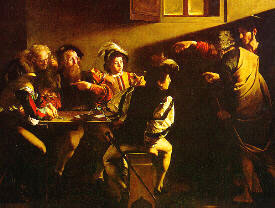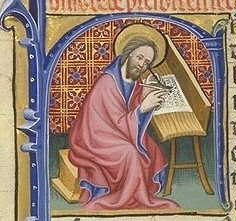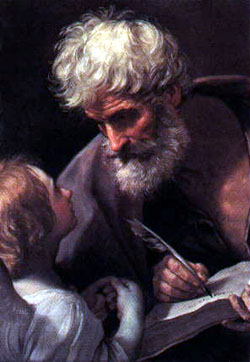

St. Matthew the Apostle
Matthew, also known as Levi, was a Jew who worked for the Roman occupying force as a tax collector. Because of this profession, and because many tax collectors extorted money to improve their own fortune, Matthew was regarded by his people as a sinner. When Jesus personally called this sinner to be one of his closest followers, he definitely made a statement. There is little known about the life of Matthew other than what is reported in the New Testament. The date he was born is not known and neither is the exact date of his death. Tradition holds that he was martyred while evangelizing in Ethiopia. One of the major sources of information about Matthew comes from the Gospel he was inspired to write. This gospel, composed around 85 AD, draws on Aramaic traditions and is generally arranged in an alternating pattern of discourse and narrative. This Gospel was meant for a Judeo-Christian audience and portrays Christianity as a continuation and fulfillment of the Jewish tradition. Matthew is symbolized by a winged human (cf Ez 1) and is patron of accountants and custom officers.  Readings:"Jesus saw a man called Matthew sitting at the tax office, and he said to him: Follow me." Jesus saw Matthew, not merely in the usual sense, but more significantly with his merciful understanding of men." He saw the tax collector and, because he saw him through the eyes of mercy and chose him, he said to him: "Follow me." This following meant imitating the pattern of his life - not just walking after him. Saint John tells us: "Whoever says he abides in Christ ought to walk in the same way in which he walked." "And he rose and followed him." There is no reason for surprise that the tax collector abandoned earthly wealth as soon as the Lord commanded him. Nor should one be amazed that neglecting his wealth, he joined a band of men whose leader had, on Matthew's assessment, no riches at all. Our Lord summoned Matthew by speaking to him in words. By an invisible, interior impulse flooding his mind with the light of grace, he instructed him to walk in his footsteps. In this way Matthew could understand that Christ, who was summoning him away from earthly possessions, had incorruptible treasures of heaven in his gift. from a homily by Saint Bede the Venerable  Prayers to Saint Matthew the Apostle:O Glorious Saint Matthew, in your Gospel you portray Jesus as the longed-for Messiah who fulfilled the Prophets of the Old Covenant and as the new Lawgiver who founded a Church of the New Covenant. Obtain for us the grace to see Jesus living in his Church and to follow his teachings in our lives on earth so that we may live forever with him in heaven. Amen. Dear publican become a Saint, after once gathering taxes and tolls how wonderful was your conversion by grace when discarding your earthly possessions you followed the Poor Man of Nazareth. The Mammon of Money is still worshiped. Inspire bankers with kindness and with the desire to help where they can; for what is done to the least, to the poor, is done to Jesus, the Son of Man. Amen.
|